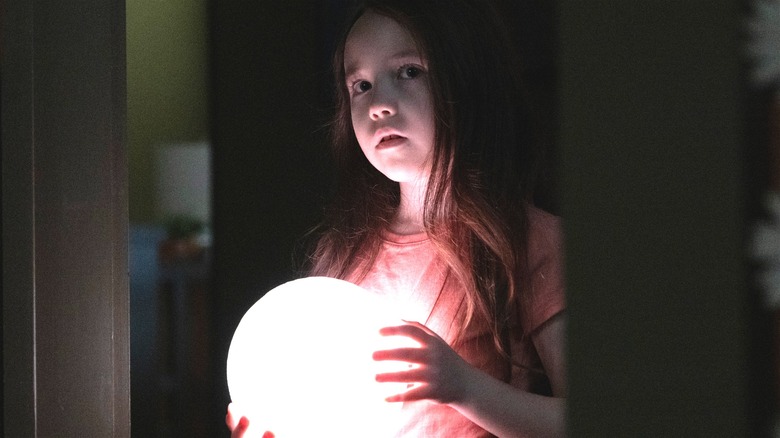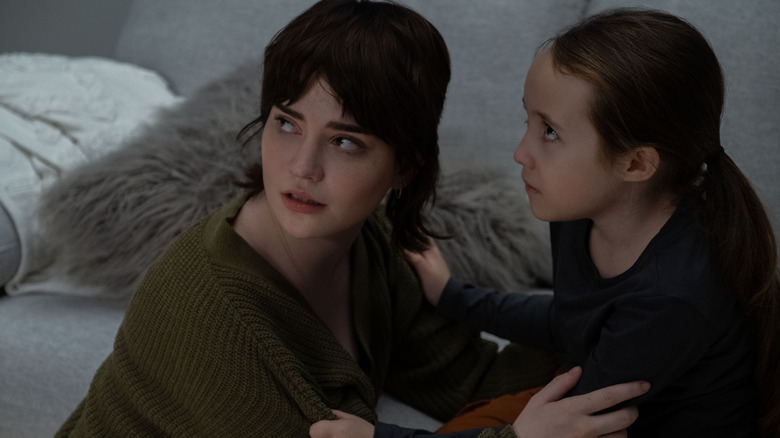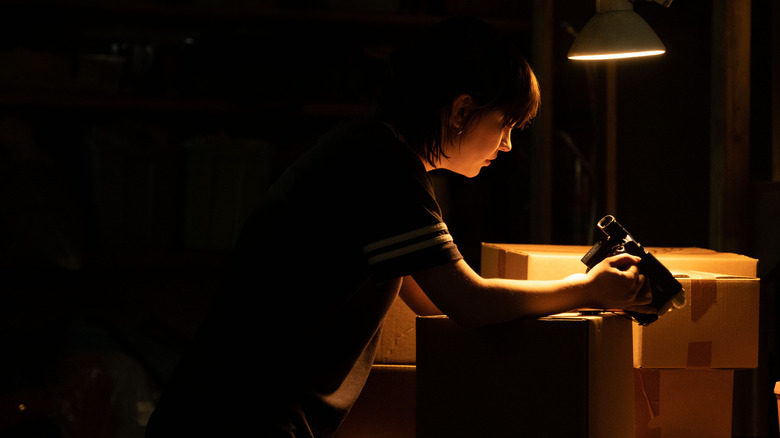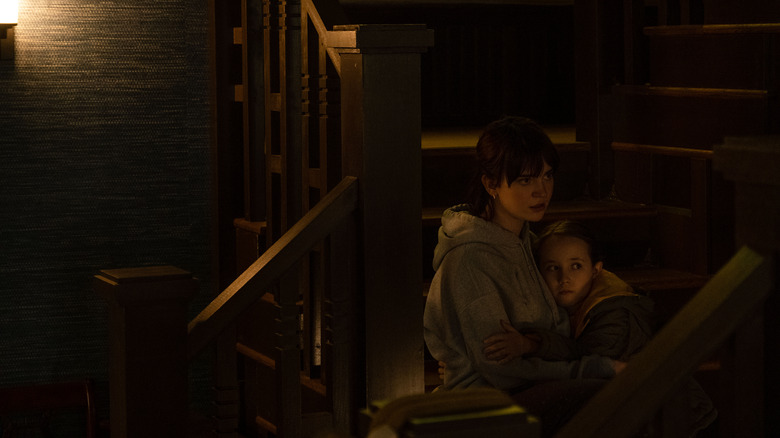The Boogeyman Doesn't Redefine The Horror Wheel (But It Doesn't Have To)
Contains spoilers for "The Boogeyman."
Horror has always been a force in cinema since cinema existed, but in recent years, the genre has enjoyed a bit of a renaissance. It seems like every new horror movie that comes out, as of late, does something exciting and unique. "Barbarian" completely changed perspective halfway through the film, offering terrific social commentary. "Bodies Bodies Bodies" was a great horror whodunnit with an appropriately hilarious twist at the end. Even something like "M3GAN" captured something within the zeitgeist to become a viral sensation and box office hit.
With all these great horror flicks taking chances and doing something different, it'd be easy to look at something like "The Boogeyman" as a disappointment. An adaptation of the Stephen King short story, "The Boogeyman" is about two girls whose mother died as they try to pick up the pieces with an increasingly withdrawn father. This makes them the perfect target for the mythical Boogeyman, who craves grief and pent-up negative emotions. What ensues is fairly standard horror movie fare where the girls hear things that go bump in the night while the audience receives brief glimpses of a monster, only ever getting a good look at it at the very end.
It's pretty by-the-books, with a structure reminiscent of dozens of horror movies that have come out before. But this doesn't hinder the viewing process. "The Boogeyman" may not upend conventional horror wisdom; there are no final twists that redefine what's come before. However, this lack of subversiveness actually proves that every good horror movie doesn't need to do something completely different, as long as there are strong characters and themes to back it up.
On paper, The Boogeyman is a dime a dozen
Beat for beat, "The Boogeyman" feels like any other horror movie involving a supernatural monster. The opening scene is appropriately terrifying. From there, the film goes between more contemplative character beats and scary moments, and you can really tell when those frights are about to happen. When Sawyer (Vivien Lyra Blair) asks her father to check under her bed and in the closet for monsters, viewers already know what to expect when he leaves. And as expected, there are multiple moments where Sawyer sees or hears something that's not quite right, using her light-up orb to illuminate dark areas, only for something to push it back menacingly.
Each spooky scene builds on what's come before, either by giving the audience a slightly better look at the monster or creating a greater sense of tension about what's inevitably going to happen. It's par the course for horror movies, with the scares themselves being just fine. Even the final reveal of the boogeyman isn't necessarily anything to write home about. It's a decently freaky monster design but nothing that sears itself into your memory like the final creature revealed at the end of "Smile."
With so many exciting voices emerging in the horror sphere, "The Boogeyman" feels like something that would be more at home in theaters 20 years ago. But there's a reason this specific structure and tropes continue to be utilized after decades — because any halfway-decent story will suffice as long as characterization remains at the forefront.
Strong characters and relatable themes keep The Boogeyman afloat
Stephen King always puts character development front and center, and the scares in "The Boogeyman" take a backseat to the film's desire to tell a story about grief and loss. Sadie Harper (Sophie Thatcher) takes the lead as a teenage girl struggling to communicate with her father after her mother's death. In addition to handling her own emotions and problems at school, Sadie now also has to look after her younger sister, who's been having her own issues even before the monster showed up. And despite being a therapist, their father, Will (Chris Messina), has difficulty listening to his daughters and figuring out what they really need. He doesn't even go with them to therapy until the very end (completing his character arc).
Plenty of people deal with the loss of loved ones. They may be like Sadie, who wants to hang onto everything they can from the recently deceased, or they may find themselves more like Will, who shuts down emotionally. Neither is particularly healthy, and even though real-life boogeymen don't exist, there are better ways to get past difficult times.
These aren't one-dimensional characters who exist for the sole purpose of eventually getting slaughtered. In fact, the three remaining Harpers live at the end, with the overall body count remaining fairly low. It makes them feel like fully-realized characters to the point where the audience wants to see how they'll deal with each other next as opposed to simply waiting until the monster comes out to attack next. It's a superb case study of how horror movies shouldn't feel the need to reinvent the genre over and over, as long as the characters and themes keep the story engaging on an intellectual level.
The Boogeyman veers away from twists to provide an engaging character study
What's interesting about "The Boogeyman," as an adaptation, is that the source material actually calls for a twist. The original short story follows a man who sees a psychiatrist after the death of his three children. This plays out in the movie with Lester (David Dastmalchian) going to see Will in his home office. However, in Stephen King's work, the story ends with the psychiatrist taking off a mask to reveal he was the boogeyman all along. Alas, the film version has no grand reveal like this.
It's the kind of twist one would expect in the modern era of horror to shake things up and keep viewers on their toes. It would certainly make "The Boogeyman" stand out more in the current landscape, but instead, the filmmakers chose to forego any deviations from the standard form. The movie plays out like so many that have come before, but the big difference between "The Boogeyman" and other films that have come up short is that this movie feels like it has confidence in its characters and story. It knows people will stay glued to their screens because they want to see this family come together after a tragedy, with any ensuing scares being a nice plus.
"The Boogeyman" shows that if a formula is not broken, there's really no need to fix it. Predictable plotting isn't inherently a bad thing as long as other elements are strong enough to tie everything together, which makes the latest Stephen King adaptation definitely worth checking out.
"The Boogeyman" is playing in theaters now.



